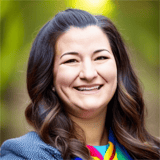Log in or create a free Rosenverse account to watch this video.
Log in Create free account100s of community videos are available to free members. Conference talks are generally available to Gold members.
Summary
How do we coordinate people for complex challenges? Certainly not with traditional work structures, designed to optimize for performance. Rather, we need new ways of working—new structures—that have been specifically designed to coordinate people for understanding. We'll look at a framework that can be used by teams, organizations, and other groups of humans working on complex problems. Stephen P. Anderson is a speaker and author who spends too much thinking about visual collaboration, how people learn, and board games; not necessarily in that order. Oh, and he’s on a mission: To make learning the hard stuff fun, by creating ‘things to think with’ and ‘spaces’ for generative play. This mission has led Stephen to MURAL, where he facilitates design strategy and innovation. Stephen's newest book, Figure It Out: Getting From Information to Understanding, has been described as both “required reading for designers and anyone else who needs to explain things” and a book that will “change the way you see the world.”
Key Insights
-
•
Complex problems differ from complicated ones by having unknown variables, incomplete or damaged information, and dynamic participants.
-
•
Traditional management methods often fail in complex challenges due to their rigidity and lack of flexibility.
-
•
Cultivating shared language and standards prevents misunderstandings and improves coordination across diverse teams.
-
•
Invisible environments like a shared vision and values deeply influence how people align and work together.
-
•
Designing physical and virtual environments intentionally shapes behaviors and outcomes in collaborative work.
-
•
Psychological safety is foundational to effective teams and is built through daily practices like empathy, candor, and trust.
-
•
Too many Objectives and Key Results (OKRs) dilute focus; organizations should limit and live by as few as possible.
-
•
Frequent organizational resets mean teams must rebuild trust and shared understanding repeatedly unless persistent structures exist.
-
•
Metaphors, like gardening for culture and language, shape how people relate to abstract concepts and facilitate change.
-
•
Accumulating multiple perspectives—including empathy and adopting contradictory views—enhances understanding and decision-making.
Notable Quotes
"The complexity of coordinating people is an entirely different beast than just working with information."
"This isn’t just about solving a puzzle, it’s about managing unknown puzzles with missing and duplicate pieces and people coming and going."
"Many managers know what to tell employees to do, but that approach probably doesn’t apply to complex problems."
"Until we clarify our language, we’ll agree on everything but actually disagree beneath the surface."
"Specialists would rather share their toothbrush than their language."
"The smartest person in the room is the room itself."
"Psychological safety comes from thousands of tiny habits practiced every day."
"A company’s sustainable competitive advantage is a culture that enables faster learning."
"When teams reorganize every 18 months, they start as infants, relearning trust and roles from scratch."
"We can change our own perspectives through assimilation or accommodation, shaping how we understand new information."
Or choose a question:
















More Videos

"Stop saying rest is a luxury or a privilege. It is not. It is a human right."
Zariah CameronReDesigning Wellbeing for Equitable Care in the Workplace
September 23, 2024

"You can have more than one priority at a time because they might have very different value and urgency profiles."
John Cutler Harry MaxPrioritization for designers and product managers (1st of 3 seminars) (Videoconference)
June 13, 2024

"Sense-making is a motivated, continuous effort to understand connections and act effectively."
Nick CochranGrowing in Enterprise Design through Making Connections
June 3, 2019

"Pilot and test your ideas before committing whenever possible to avoid unnecessary disruption."
Deanna SmithLeading Change with Confidence: Strategies for Optimizing Your Process
September 23, 2024

"The digital identity card is an existing asset that we didn’t have to reinvent, but the user experience on top was lacking."
Magdalena ZadaraZero Hour: How to Get Far Quickly When Starting Your Digital Service Unit Late
November 16, 2022

"Thousands of users were clicking on a text that wasn’t even a link—it looked like one, but wasn’t."
Nova Wehman-BrownWe've Never Done This Before
June 4, 2019

"By identifying the triggers that lead customers to ask questions, I was able to help data scientists figure out what training data to access and explore."
Liwei DaiThe Heart and Brain of the AI Research
March 31, 2020

"My phone buzzed again. I have a job this weekend for you and your team to help on the COVID response if you’re available."
Gordon Ross12 Months of COVID-19 Design and Digital Response with the British Columbia Government
December 8, 2021

"Listening to the 10% truth means acknowledging a bit of what they say even if you’re irritated."
Tutti TaygerlyMake Space to Lead
June 12, 2021
















